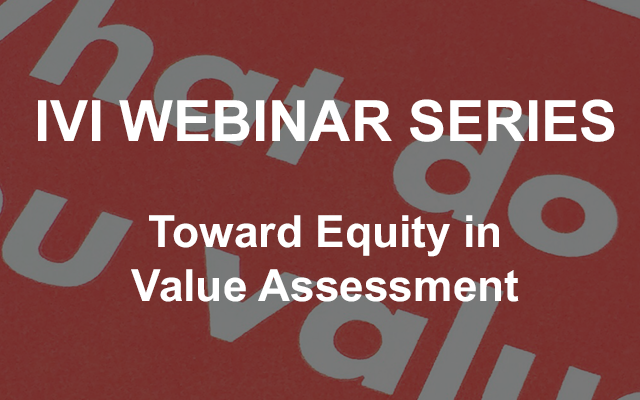Author: Jennifer Bright, MPA, Executive Director, IVI
“Poor value assessment hardwires inequity into health.”
– Michelle McMurry-Heath, MD, PhD; Biotechnology Innovation Organization
– Session 1: Meaningful Action Toward Health Equity
IVI’s three-part series on health equity and value assessment concluded earlier this month, and we’re proud to have convened these thoughtful dialogues among diverse experts from patient, research, life science, employer, and clinician communities across North America.
Despite our participants’ divergent roles in the health ecosystem, the series highlighted our common view: we need to act now to improve health equity and to ensure it is upheld in the evolution of value-based care.
The series emphasized needed change in patient engagement, research, and value assessment methods; and organizational and governmental policy. In addition to informing IVI research and activities, we aimed to identify wider opportunities to initiate change in the value assessment methods field. Moreover, we strove to identify areas for policy action that will support the inclusion of equity measures in future value assessment.
Three key themes emerged from this series:
- The diversity of patients and their experience demands investment in representative research. Research that informs inputs to value assessment must be designed so that the wide variety of characteristics that occur in populations – clinical, demographic, socioeconomic, cultural – can be identified and measured. This requires more than verbal commitment: engagement, research design, and tireless efforts to meet patients where they are must be the order of the day. Patient communities and community organizations are key leaders and partners in effecting real progress. Innovators, researchers, payers, and purchasers have a responsibility to ensure meaningful partnership and to invest is measuring factors that matter to those with diverse lived experience.
“Patients wear multiple identities, and we need to think through a lens of inclusivity to understand patient heterogeneity.”
– Upsal Basu Roy, PhD, MPH, LUNGevity Foundation
– Session 1: Meaningful Action Toward Health Equity
- Methods to incorporate equity perspective in value and health technology assessment must no longer be considered “novel.” It’s clear that research methods must improve to support an equity perspective in evaluating the benefits, risks, and costs of novel and existing therapeutic interventions. REsearch on equity in cost-effectiveness analysis (CEA) is only nascent, but early results show that paying attention to equity from the outset can improve modeling. There are precedents – such as distributional CEA in Europe and the development of an equity matrix used by the Public Health Agency in Canada – from which U.S. researchers and decision-makers may adapt practical, applied methods.
- Policy at both organizational and governmental levels must uphold the importance of health equity as a fundamental component of value. Employers and payers must demand and utilize data with a focus on defining how benefit design, health education, and outcomes measurement support equitable access. Multi-stakeholder collaboration and transparent sharing of data and learning must occur to sustain system-wide change. Finally, federal policy must uphold equity as a central tenet of value measurement and value-based care and reimbursement.
“[We must] incorporate equity directly into definitions of value.”
– Joshua M. Liao, MD, MSC, FACP, University of Washington School of Medicine
– Session 3: Walking the Talk – How Should Policy Uphold Equity in Value Assessment?
Equity is a fundamental principle in IVI’s work. By initiating this important discussion, we have pinpointed opportunities for meaningful and sustainable change to patient-directed research, value assessment methods, and policy. Through partnership and continued learning, IVI intends to target initiatives that improve the ability to measure value with equity as a central consideration. The hard work lies ahead.




